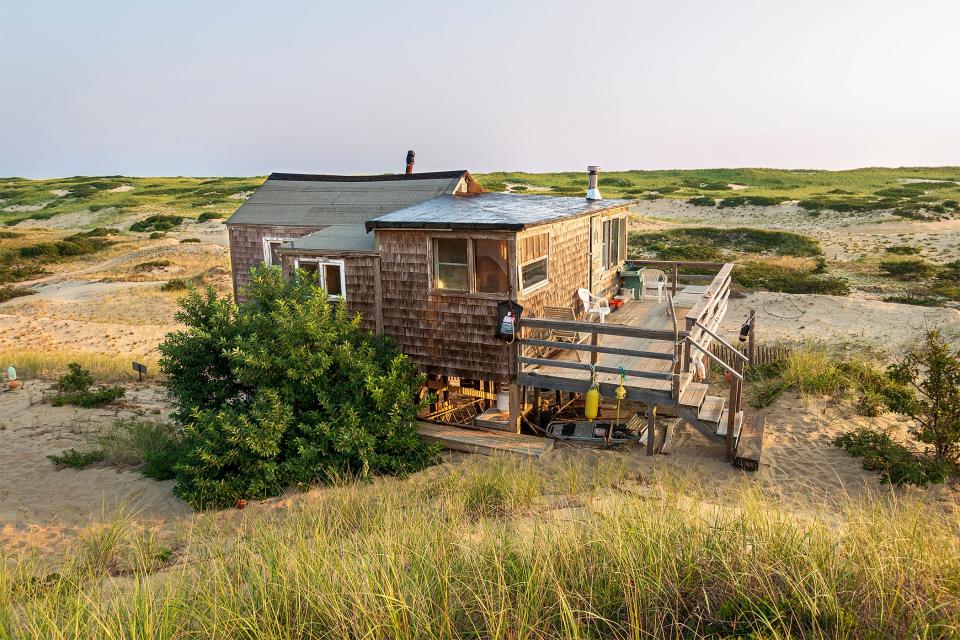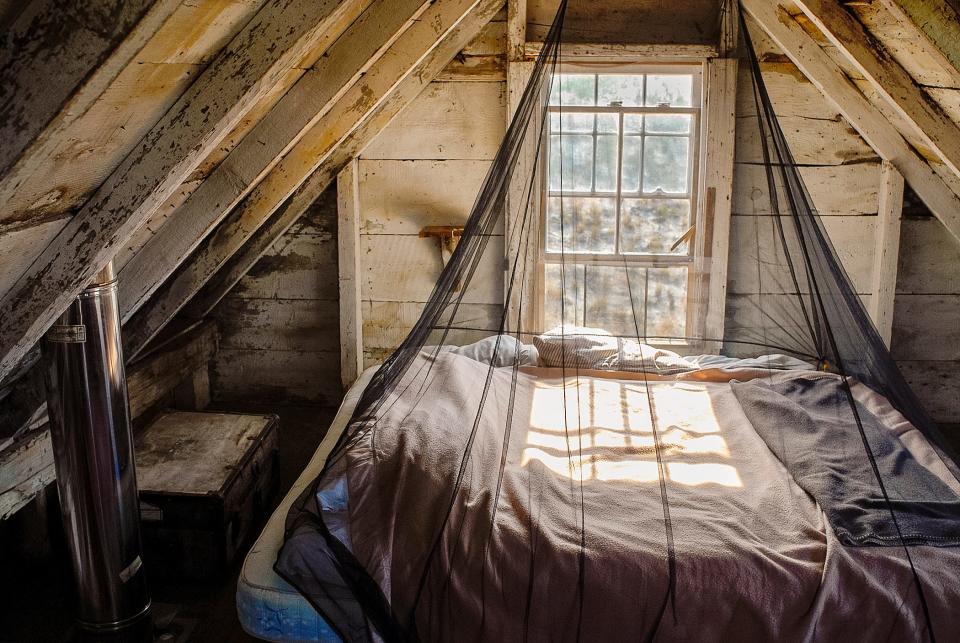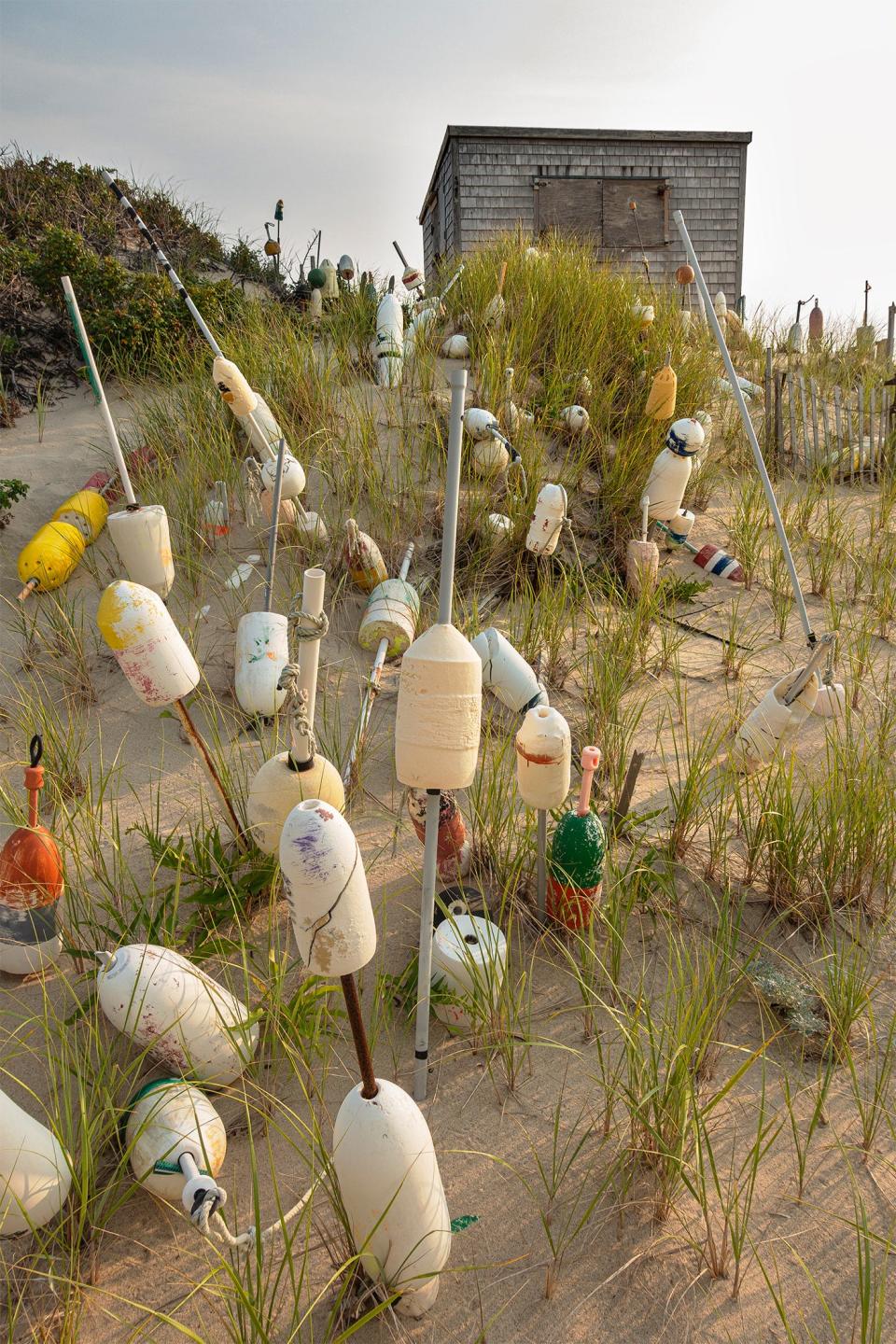Focusing on the dune shacks: Provincetown photographer crafts book of 'primal landscape'
Jane Paradise has long been attuned to the alluring call of the dunes and felt the pull to explore their austere beauties, to enwrap herself in the sounds of rising and falling waves, wind-surfing gulls, susurrating sea grasses, and endless grains of sand skittering and shifting like infinitesimal shards of glass.
It is a landscape that has inspired countless artists and writers, and drawn seekers of solitude and simplicity with a desire to live for a time in the present moment — to "live deliberately," as one famous visitor, Henry David Thoreau, put it, "to front only the essential facts of life."

And it is there that Paradise, both artist and seeker, found inspiration for her latest project, "Dune Shacks of Provincetown," a newly published book of photography and text that highlights the "rustic, isolated, and beautiful dune shacks" scattered among the dunes, and the "eclectic people" who have lived in them.
"I started going out there when I was a child," said the Connecticut-born photographer, who grew up vacationing with her family in Truro. "We used to go running up and down the dunes. I always had an attraction to them."

But it wasn't until later that she started to focus in on the dune shacks, each one a unique construction often incorporating the flotsam and jetsam of the shore, from weathered pieces of driftwood to the relics of storm-torn ships. Some of the shacks were originally lifesaving shelters, but most were cobbled together by those wanting to get away from humanity for a while and immerse themselves in the isolation of the dunes.
Paradise will give a talk about her book, and sign copies, at the Cape Cod Museum of Art, 60 Hope Lane, Dennis, from 5:30 to 6:30 p.m. Friday (Jan. 20). The cost is $12 or $10 for museum members. For tickets, visit www.ccmoa.org
A solo exhibition entitled "Dune Shacks of Provincetown" is also planned at the museum, May 3-July 30.
Finding simplicity and beauty in Provincetown's 'primal landscape'
Paradise calls the backshore of Provincetown where the dune shacks face the open sea her "primal landscape," and she goes there seeking moments of solitude. It was while exploring the dunes as an adult she began photographing the shacks and the environment around them, she said.

"I began to wonder about their occupants, the determined sojourners who braved the arduous, sandy trek to reach their homes," she writes in an introduction included in the book. "I also wondered what the shacks looked like inside. This began my dune shack journey: ten years of research, photo shoots, friendships, an artist residency, and more than a dozen overnight stays, all of which culminated in this book."
The dunes of Provincetown called Paradise — an internationally recognized photographer who is represented by Provincetown's Alden Gallery and Galatea Fine Art in Boston — all the way from San Francisco, where she and her Boston-born husband, Frank, lived for a time. In 2015, they returned to New England and settled in Provincetown. She has since gained an intimate insight into dune shack life, having spent two weeks in one as an artist in residence, and earned other stays through a lottery.
It is an unforgiving environment, and a living full of mundane, but essential, tasks — such as drawing well water and lugging jugs through heavy sand for washing and cooking, as well as maintaining the compost outhouse, living without air conditioning, passing the dark hours by kerosene lamp, and cooking with propane — but Paradise said there is a certain poetry to be found in its simplicity.
To her, and many others, it is a sanctuary — a place Thoreau described in "The Beach" in August of 1855 as "the wreck of all cosmical beauty there within."
"I just really find it comforting being out there," Paradise said. "You're alone. You go to bed at night and there's no trace of anything on the sand, but then you wake up and there are all these animal tracks. You think it's going to be really quiet. Unexpectedly, it really isn't. You get the sound of the ocean, you get the coyotes, you get the sparrows, you get the gulls screeching."
Book highlights dune shacks, inhabitants and environs
Paradise's "Dune Shacks of Provincetown" book, published by Schiffer and released last month, "sort of happened organically," she said, as she simultaneously experienced the dune shacks herself and collected words about the shacks and the dune environment written by others, from Thoreau, Tennessee Williams, Jack Kerouac and other famous writers, to "less known, but equally fascinating, local artists, residents, shack dwellers and dreamers of all types."

"I was reading books about Provincetown over the course of the last 10 years, probably more. If I liked a certain paragraph, I'd write it in a notebook," Paradise said. "Somewhere along the line I said, 'after staying at all these dune shacks, let me see if I have quotes about the dunes that I can pair with my photographs of the dune shacks.'"
The award-winning photographer hired Joanne Dugan, who teaches at Provincetown's Fine Arts Work Center in the summer, as creative editor. Together, they selected and edited the quotes and other text, matching the photos with the quotes, and then sequencing them.
In all, there are 94 color images coupled with quotes about life among the dunes, a foreword by Michael Mailer, the son of famed writer Norman Mailer, and an essay by Mildred Champlin, whose family has owned the dune shack known as "Mission Bell" since 1953.
There are 19 shacks still in existence within the Cape Cod National Seashore. At one time there were many more, but some fell into the ocean or were past saving and were torn down by the National Park Service. The very first known dune shack, Paradise said, was built in 1794 and many others followed, going up from Provincetown to Monomoy. They vary in size, from tiny 9-foot-by-20-foot spaces just big enough for a double bed, a kitchenette with a single propane burner, a table and chairs, to others with multiple rooms.
Paradise said each shack is unique, and some are named, such as Thalassa and Euphoria. The book includes interior and exterior photos of the shacks, as well as images of the landscape.
"There are night photos, day photos, sunsets, moon photos," said Paradise. "I'm really trying to tell the cultural history of the dune shacks through the photos."
Just one image has a person in it: Paradise's husband playing the violin. She said it is among her favorite images, one that is particularly poignant given that her husband is an Alzheimer's patient — she has an ongoing Instagram project with photos and "snippets of conversation" documenting the couple's experiences with Alzheimer's in an effort to raise awareness about the disease.
"Dune Shacks of Provincetown" ($34.99) is available at bookstores in Provincetown, from the publisher, as well as at Amazon, and online from Barnes & Noble and Target. The book is also for sale through the museum event. For more information, and to see more of Paradise's work, visit janeparadise.com.
Want to stay in a dune shack?
Community residencies in Provincetown's dune shacks are open to all and are selected through a lottery system. You may select up to three weeks in each shack. A $35 donation to the Friends of the C-Scape Dune Shack provides entry into an additional lottery for three weeks set aside for Friends at a reduced rate.
Community residencies in the dune shacks located within Peaked Hill Bars National Register Historic District of the Cape Cod National Seashore are open to all and selected through a lottery system. You can choose up to three weeks in each shack. The Provincetown Community Compact maintains and administers the shacks under an agreement with the Cape Cod National Seashore.
To learn more, visit https://thecompact.org/dune-shacks.html
Contact Heather McCarron hmccarron@capecodonline.com.
Stay connected with Cape Cod news, sports, restaurants and breaking news. Download our free app.
This article originally appeared on Cape Cod Times: Provincetown photographer Jane Paradise captures 'primal' dune shacks

